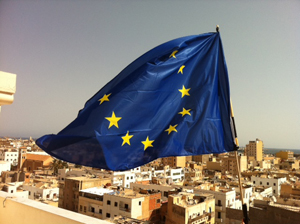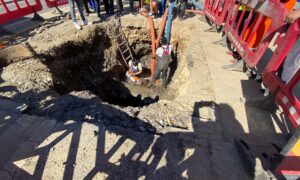
© European Union, 2011
In his address delivered at the United Nations’ General Assembly on 22 September, Herman Van Rompuy, President of the European Council, declared: „Now there is a „responsibility to assist” the new Libya with the political transition, the reconciliation and the reconstruction of a united country. The Transitional National Council, today in the Libya seat, is ready for that task. Europe was, is, and will remain on the side of the Libyans.”
The same day, the Council adopted a set of measures designed to help the Libyan economy recover after the civil war and to assist the UN support mission to the country. These decisions implement the UN Security Council resolution on Libya adopted on 16 September.
Resolution (2009/2011) partly lifts the arms embargo and assets freeze imposed on Libya. The Council has now authorised the release of frozen funds in order to cover humanitarian needs, to support the resumption of…

© European Union, 2011
In his address delivered at the United Nations’ General Assembly on 22 September, Herman Van Rompuy, President of the European Council, declared: „Now there is a „responsibility to assist” the new Libya with the political transition, the reconciliation and the reconstruction of a united country. The Transitional National Council, today in the Libya seat, is ready for that task. Europe was, is, and will remain on the side of the Libyans.”
The same day, the Council adopted a set of measures designed to help the Libyan economy recover after the civil war and to assist the UN support mission to the country. These decisions implement the UN Security Council resolution on Libya adopted on 16 September.
Resolution (2009/2011) partly lifts the arms embargo and assets freeze imposed on Libya. The Council has now authorised the release of frozen funds in order to cover humanitarian needs, to support the resumption of activities in the Libyan oil and banking sectors and to assist with the formation of a civilian government.
On 20 September, President Van Rompuy emphatically welcomed the new United Nations Security Council Resolution setting up a UN mission in Libya. „The EU is committed to implement it within all its powers and competences,” he said at a High-Level Meeting on Libya in New York. The United Nations Support Mission in Libya (UNSMIL) aims to assist Libyan national efforts to restore public security, foster reconciliation and promote the democratic process. Its mandate will initially run for three months.
Meanwhile, the European Union continues its humanitarian aid efforts, coordinated under the United Nations. An EU humanitarian aid and civil protection (ECHO) team remains in Tripoli to monitor the humanitarian situation. Its present priorities include the protection of civilians and assessing the movement of populations and further needs arising from this. The team is working together with other international partners, under the leadership of the United Nations Office for the Coordination of Humanitarian Affairs. In addition to the Libyan capital, ECHO experts are deployed at the Tunisian-Libyan border and ECHO has an office in the eastern town of Benghazi. „We provide Libyans with direct humanitarian assistance, following the principles of neutrality and impartiality,” said José Manuel Barroso, President of the European Commission.
As of 11 September 2011, the EU’s and member states’ financing of humanitarian aid and civil protection in the Libyan crisis totalled 153 232 569 euros. Commission-funded humanitarian assistance, worth 70 million euros, has enabled the evacuation of 24 000 third-country nationals, the delivery (including the financing, coordination mechanisms and air transport) of relief aid, and the provision of emergency health care, just to name a few examples.
Beyond tackling the most urgent humanitarian needs, the European Union is preparing both immediate and long-term measures to support the stabilisation process led by the Libyan National Transitional Council (NTC). These include activities in the field of security sector reform and disarmament; short-term assistance for the NTC to build up state institutions; and provision of training to help strengthen civil society.
The opening of an EU office in Tripoli on 31 August provided a strong symbol of EU support for the people of Libya. The other EU office in Benghazi remains open.
The EU’s engagement with Libya will be based on the European Neighbourhood Policy and the Partnership for Democracy and Shared Prosperity. On 18 July, Spanish diplomat Bernardino León Gross was appointed by the Council as the first ever European Union Special Representative for the Southern Mediterranean, tasked with supporting the transition to democracy in the EU’s southern neighbourhood.
More information:
EU implements latest UN decisions in support of Libya (pdf)
Address by President Van Rompuy at the High-Level Meeting on Libya (pdf)
Libyan crisis – EU humanitarian aid factsheet
Responding to the challenge of stabilisation in post-conflict Libya (pdf)
What the EU has been doing to support the Libyan people (Commission press release)
European Union external action website on Libya

















